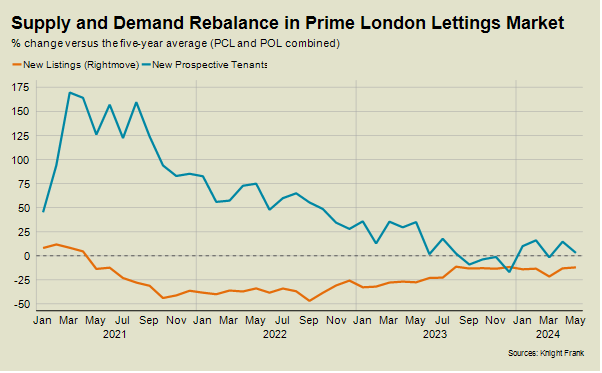Economics Confronts Politics in Prime London Lettings Market
June 2024 PCL lettings index: 220.7
June 2024 POL lettings index: 221.9
2 minutes to read
As supply increases and demand reduces to normal levels, the downwards pressure on rental values in prime London postcodes has intensified.
Rental value growth in prime central London (PCL) fell to 3.5% in the year to June, while the figure was 3.6% in prime outer London (POL).
In both cases, it was the lowest figure since July 2021 when the long-let market was flooded with short-let properties during the pandemic.
Supply subsequently fell sharply, in part thanks to landlords selling up during a stamp duty holiday, which meant rents were growing by more than 20% at one stage as demand far exceeded supply (see chart).

Landlords and tenants will now understandably be wondering what happens next.
It’s not a straightforward question so close to an election and the probable revival of the Renters Reform Bill by the Labour Party.
We forecast that rental value growth will be 2% in PCL and 2.5% in POL in 2024 followed by sub-5% growth in subsequent years, although that could rise if landlords find any new regulations too punitive and decide to sell.
Labour, for example, has said it plans to end bidding wars among tenants if elected.
The ambition to make life easier for tenants is logical but this particular proposal is based on the assumption that low supply and high demand are both permanent features of the lettings market. Instead, the reality is that as supply rises, tenants increasingly feel able to shop around and the market self-corrects.
Indeed, what is currently happening in higher-value markets in the capital underlines how the economic law of supply and demand is universal.
Owners at higher price points are typically more discretionary and have been able to switch from the sales to lettings market because property prices are flat or falling.
The number of new lettings listings in PCL and POL combined was 12% below the five-year average (excluding 2020) in May, Rightmove data shows. For rental properties above £1,000 per week, there was an equivalent increase of 39%.
The result is that almost all tenancies above £1000 per week agreed in the last month have been below the asking rent or subject to a rent reduction, said David Mumby, head of prime central London lettings at Knight Frank. “It certainly feels like peak pricing has now passed,” he said.
Political interventions can be a blunt instrument to produce a desired outcome and can often produce unintended consequences.